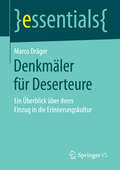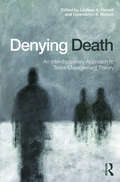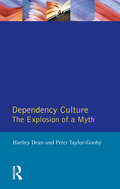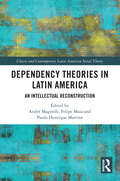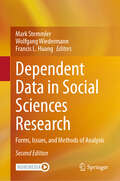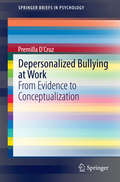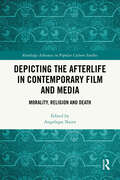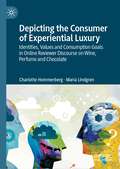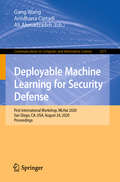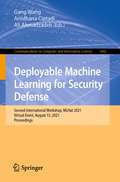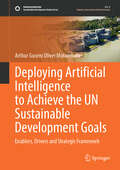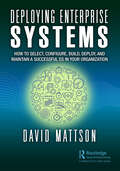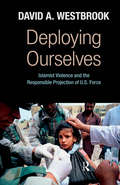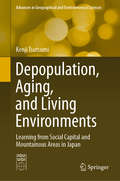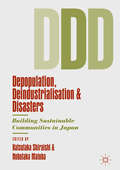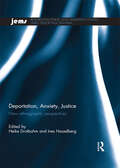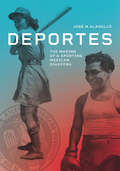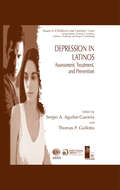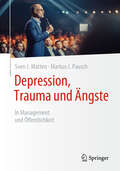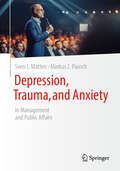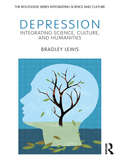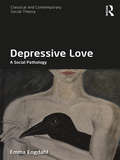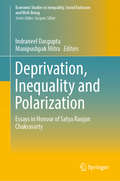- Table View
- List View
Denkmäler für Deserteure: Ein Überblick über ihren Einzug in die Erinnerungskultur (essentials)
by Marco DrägerMarco Dräger thematisiert in diesem essential nicht allein die Errichtung von Denkmälern für Deserteure in den letzten ca. 35 Jahren, sondern allgemeiner den öffentlichen Diskurs über das Phänomen Desertion in Deutschland − insbesondere im Kontext der Rezeption des Nationalsozialismus. Der Autor analysiert den Wandel dieses Diskurses von der Zeit des Nationalsozialismus bis in die unmittelbare Gegenwart. Im Kontext von Nachrüstungsdebatte und Friedensbewegung kam zu Beginn der 1980er Jahre in einigen Städten die Forderung nach der Errichtung von Denkmälern für Deserteure auf. Das kontrastierte scharf mit der bisherigen Sichtweise auf Deserteure: Bis dato wurden sie in der Öffentlichkeit nämlich vor allem als Feiglinge und Drückeberger betrachtet.
Denying Death: An Interdisciplinary Approach to Terror Management Theory
by Lindsey A. Harvell Gwendelyn S. NisbettThis volume is the first to showcase the interdisciplinary nature of Terror Management Theory, providing a detailed overview of how rich and diverse the field has become since the late 1980s, and where it is going in the future. It offers perspectives from psychology, political science, communication, health, sociology, business, marketing and cultural studies, among others, and in the process reveals how our existential ponderings permeate our behavior in almost every area of our lives. It will interest a wide range of upper-level students and researchers who want an overview of past and current TMT research and how it may be applied to their own research interests.
Denying Death: An Interdisciplinary Approach to Terror Management Theory (The\enlightenment World Ser.)
by Lindsey A. Harvell Gwendelyn S. NisbettThis volume is the first to showcase the interdisciplinary nature of Terror Management Theory, providing a detailed overview of how rich and diverse the field has become since the late 1980s, and where it is going in the future. It offers perspectives from psychology, political science, communication, health, sociology, business, marketing and cultural studies, among others, and in the process reveals how our existential ponderings permeate our behavior in almost every area of our lives. It will interest a wide range of upper-level students and researchers who want an overview of past and current TMT research and how it may be applied to their own research interests.
Dependency Culture
by Peter Taylor-Gooby Hartley DeanFirst published in 1992. Routledge is an imprint of Taylor & Francis, an informa company.
Dependency Theories in Latin America: An Intellectual Reconstruction (Classic and Contemporary Latin American Social Theory)
by André Magnelli, Felipe Maia and Paulo Henrique MartinsThis book offers a discussion of the origins of Latin American dependency theories and their implications for contemporary social theory. The book explores the conditions of emergence of this intellectual movement, the trajectories of some of its main formulators, as well as the circulation of their ideas, their reception in other contexts, and their influence on other theoretical formulations and problems of the present. The book is aimed at social scientists interested in broadening the scope of social theory towards the Global South, in processes of knowledge circulation between central and semi-peripheral regions, as well as in understanding the problems of dependency, modernisation, and development processes in Latin America. The book can be used both as an introduction to these themes and to delve deeper into specific issues.
Dependent Data in Social Sciences Research: Forms, Issues, and Methods of Analysis
by Wolfgang Wiedermann Mark Stemmler Francis L. HuangThis book covers the following subjects: growth curve modeling, directional dependence, dyadic data modeling, item response modeling (IRT), and other methods for the analysis of dependent data (e.g., approaches for modeling cross-section dependence, multidimensional scaling techniques, and mixed models). It presents contributions on handling data in which the postulate of independence in the data matrix is violated. When this postulate is violated and when the methods assuming independence are still applied, the estimated parameters are likely to be biased, and statistical decisions are very likely to be incorrect. Problems associated with dependence in data have been known for a long time, and led to the development of tailored methods for the analysis of dependent data in various areas of statistical analysis. These include, for example, methods for the analysis of longitudinal data, corrections for dependency, and corrections for degrees of freedom. Researchers and graduate students in the social and behavioral sciences, education, econometrics, and medicine will find this up-to-date overview of modern statistical approaches for dealing with problems related to dependent data particularly useful.
Depersonalized Bullying at Work
by Premilla D'CruzThe book advances the nascent concept of depersonalized workplace bullying, highlighting its distinctive features, proposing a theoretical framework and making recommendations for intervention. Furthering insights into depersonalized bullying at work is critical due to the anticipated increased incidence of the phenomenon in the light of the competitive contemporary business economy, which complicates organizational survival. Drawing on two hermeneutic phenomenological inquiries set in India focusing on targets and bullies, the book evidences that depersonalized bullying is a sociostructural entity that resides in an organization's structural, processual and contextual design. Enacted by supervisors and managers through the engagement of abusive and aggressive behaviours, depersonalized bullying is resorted to in the pursuit of competitive advantage as organizations seek to ensure their continuity and success. Given the instrumentalism associated with the world of work, targets and bullies encountering depersonalized bullying display largely ambivalent responses to their predicament. Ironically, then, organizations' gains in terms of effectiveness are offset by the strains experienced by these protagonists. The theoretical generalizability of the findings reported in the book facilitates the development of an integrated framework of depersonalized workplace bullying, laying the foundations for forthcoming empirical and measurement endeavours that progress the concept. The book recognizes that whereas primary level interventions mandate repositioning the extra-organizational environment and/or recasting organizational goals to balance business and employee interests, secondary level and tertiary level interventions encompass various types of formal and informal social support to address targets' and bullies' interface with depersonalized bullying at work.
Depicting the Afterlife in Contemporary Film and Media: Morality, Religion and Death (Routledge Advances in Popular Culture Studies)
by Angelique NairnWhat lies beyond death? This book brings together a diverse collection of scholarly voices to explore how popular culture imagines—and reimagines—the afterlife. Drawing from film, television, video games, literature, advertising, and digital technologies, this book examines how narratives about Heaven and Hell, ghosts and gods, memory and immortality shape contemporary understandings of morality, death, and what may come after.From Pixar’s Coco to The Good Place, Ghostbusters, Upload, and Westworld, these chapters interrogate the enduring power of afterlife narratives to provide existential comfort, moral guidance, and cultural critique. Whether through the lens of theology, philosophy, or secular imagination, contributors consider how popular media blurs the sacred and the profane, challenging dogma, reframing ethics, and offering new possibilities for how we remember the dead and live among the living.Spanning topics such as queer love in the afterlife, Indigenous cosmologies, digital resurrection, and the theological implications of robots, Depicting the Afterlife in Contemporary Film and Media: Morality, Religion and Death is a timely exploration of how the afterlife continues to haunt and inspire modern culture.Essential reading for scholars of media studies, religious studies, cultural theory, and anyone fascinated by humanity’s oldest and most enduring question: what happens when we die?
Depicting the Consumer of Experiential Luxury: Identities, Values and Consumption Goals in Online Reviewer Discourse on Wine, Perfume and Chocolate
by Charlotte Hommerberg Maria LindgrenThis book sheds light on the addressees of online reviewer discourse on wine, perfume and chocolate in order to explore how the discourse construes the consumer of experiential luxury. In the 21st century, luxury is more complex than ever before. Luxury products have become more affordable and hence accessible to new markets and consumer segments, and the groups of consumers seeking luxury experiences are more heterogeneous than ever. Yet, consumption choices as well as how these are thought about, evaluated and talked about still function to position consumers with respect to both how they see themselves and how they want others to see them. Many consumers seek to consume in subtle and sophisticated ways. They strive to develop consumption expertise with a view to maximizing their enjoyment from the luxury experience, avoiding overt displays of wealth while signalling status by means of luxury insight only available to the cognoscenti. One way for aficionados to develop their insight into the diversified and elusive realm of contemporary luxury is to engage with online reviewer discourse. The authors take a discourse analytic approach informed by the Appraisal model to expose the imagined addressees’ characteristics and behaviour, the luxury values they embrace and the goals of their luxury consumption. The authors argue that the activity of online reviewers is such a crucial arena in contemporary luxury that a new form of luxury consumption has emerged, which they label review-based luxury. This book will be of interest to students and academics in the fields of Linguistics, Discourse Analysis, Communication, Argumentation, Media Studies and Marketing, as well as anyone with a general interest in wine, perfume and chocolate as experiential luxury.
Deployable Machine Learning for Security Defense: First International Workshop, MLHat 2020, San Diego, CA, USA, August 24, 2020, Proceedings (Communications in Computer and Information Science #1271)
by Gang Wang Arridhana Ciptadi Ali AhmadzadehThis book constitutes selected papers from the First International Workshop on Deployable Machine Learning for Security Defense, MLHat 2020, held in August 2020. Due to the COVID-19 pandemic the conference was held online. The 8 full papers were thoroughly reviewed and selected from 13 qualified submissions. The papers are organized in the following topical sections: understanding the adversaries; adversarial ML for better security; threats on networks.
Deployable Machine Learning for Security Defense: Second International Workshop, MLHat 2021, Virtual Event, August 15, 2021, Proceedings (Communications in Computer and Information Science #1482)
by Gang Wang Arridhana Ciptadi Ali AhmadzadehThis book constitutes selected and extended papers from the Second International Workshop on Deployable Machine Learning for Security Defense, MLHat 2021, held in August 2021. Due to the COVID-19 pandemic the conference was held online. The 6 full papers were thoroughly reviewed and selected from 7 qualified submissions. The papers are organized in topical sections on machine learning for security, and malware attack and defense.
Deploying Artificial Intelligence to Achieve the UN Sustainable Development Goals: Enablers, Drivers and Strategic Framework (Sustainable Development Goals Series)
by Arthur Guseni MutambaraThis book provides research insights into how Artificial Intelligence (AI) can be used to achieve the UN&’s Sustainable Development Goals (SDGs) – 17 interconnected goals designed to address the world&’s most pressing challenges by 2030. It reviews the SDGs and discusses why progress has been mixed and uneven across different countries, regions and goals. The book posits that attaining the SDGs will depend on enhanced global cooperation, increased funding, improved infrastructure, public-private partnerships, regional/continental integration, addressing the climate crisis, inclusive economic transformation, and visionary leadership. More specifically, the publication advocates leveraging innovative and transformative technologies, particularly the deployment of AI. The research acknowledges the risks of digital imperialism, data colonialism and technological exclusion, especially in emerging and least industrialised economies. Hence, in deploying AI to achieve the SDGs, the book puts a premium on decoloniality in AI systems and democratising AI technology. Provides a critique of the current SDGs approach by reframing the goals as a comprehensive risk assessment of humanity&’s most pressing threats in the 21st century; Features broad and holistic interventions to accelerate the attainment of the SDGs; Provides a comprehensive but accessible introduction to AI concepts and advanced innovations such as AlphaFold, ChatGPT-4, DeepSeek-R1, Grok 3, and autonomous vehicles (drones and driverless cars); Discusses the AI strategies of leading economies and assesses the impact of AI on geopolitics; Provides a comprehensive critique of global AI efforts by the UN and African Union, while proffering alternative paradigms and frameworks; Presents the enablers, drivers and strategic framework of AI deployment to achieve the SDGs; Develops and presents details of six distinct but related components of a novel Strategic Framework for developing and adopting AI – Vision, Strategy, Policy, Governance, Legislation/Regulations, and Implementation Matrix; Outlines specific ways that AI can be deployed to achieve each of the 17 SDGs and reviews seven countries&’ experiences; Explores an innovative, forward-looking, and technology-driven framework for equitable global socio-economic transformation to succeed the SDGs post-2030.
Deploying Enterprise Systems: How to Select, Configure, Build, Deploy, and Maintain a Successful ES in Your Organization
by David MattsonThis book focuses on topics that business managers and project teams in global enterprises need to understand and follow to successfully deploy an Enterprise System (ES) for their organization. It explains: Why this type of software product will appeal to global organizations with the promise to replace their older individual systems with a single integrated ES and how an ES allows companies to integrate their unique operations with a single system of many integrated modules that are designed to provide prebuilt and tested applications; New concepts, steps, risks, and methods that an organization should follow to successfully create and deploy an ES; and the top 10 reasons that ES projects fail and the practices to manage these risks. In addition, the book describes a new Implementation Model and methods to ensure success in deploying an ES across a firm with several divisions, international operations, product lines, and infrastructure. Essentially, this book: Describes, in non-technical terms, what business functions this new software product will improve Shows how an enterprise should use this software product to accomplish their goals to install and use this new technology to upgrade their older systems Explains what an organization’s management and project teams should avoid during selecting, planning, and implementing their ES to avoid common mistakes Describes the skills and experience (including IT and general management) the Project Manager must have to lead the project team(s) to implement this advanced system.
Deploying Ourselves: Islamist Violence, Globalization, and the Responsible Projection of U.S. Force
by David A. WestbrookIn Deploying Ourselves, David A. Westbrook puts the case for major reform of US national security. He argues that today's national security establishment is outdated and entrenched in a model of defence more befitting the post-World War II Cold War era than today's realities. In a world without military peers, Westbrook argues, the US must re-create its institutions in order to wield influence globally, based on co-operation with other states and groups. Deploying Ourselves includes specific proposals to make US national security institutions more democratically accountable.
Depopulation, Aging, and Living Environments: Learning from Social Capital and Mountainous Areas in Japan (Advances in Geographical and Environmental Sciences)
by Kenji TsutsumiThis book provides perspectives on depopulated areas and regional social capital from positivistic field surveys. Among the developed countries of the world, Japan has a very small amount of national land, with almost 70% of it being in mountainous locations. Concentration of populations and economic capital into large metropolitan areas along with many depopulated and population-aged regions in the mountainous parts can be seen in the country. A very clear regional disparity has arisen in Japan, especially since the era of its high economic growth. This book also offers critical suggestions for the shrinking societies of the developed world in the era of Society 5.0, the fifth stage of society where economic development is achieved and social issues are resolved by the fusion of cyber and physical space. To begin, the book refers to an outline of depopulation and depopulated areas in Japan. Then, it deals with issues of depopulation, out-migration from a mountainous village, revitalization of local industries, and maintenance of daily living functions in these areas. This book is suitable for students and scholars of the social sciences, regional planners, staffs of government offices, members of NPOs, general citizens, and the many other people who are interested in sustainability of a region and a community in a shrinking social environment.
Depopulation, Deindustrialisation and Disasters: Building Sustainable Communities in Japan
by Katsutaka Shiraishi Nobutaka MatobaDepopulation, Deindustrialisation and Disasters are three of the biggest problems facing Japan today. This book discusses how sustainable communities are being created in Japan in an attempt to overcome the threat of the triple Ds . It provides an overview of how each of these three core issues endangers the sustainability of local communities especially, but also discusses how they might also provide an opportunity to replace outdated paradigms, rooted in expansion and competition, with a new way forward on a global scale. The authors explore how the Japanese government has followed the worldwide trend of implementing neo-liberal policies in response to globalisation and how these policies have resulted in a mass exodus into larger cities such as Tokyo, leaving local communities more vulnerable to socio-economic threats. The authors highlight non-metropolitan areas facing the ‘triple D’ threat and introduce several case studies on how these are working towards achieving a more sustainable future. Written by members of the LORC (Research Centre for the Local Public Human Resources and Policy Development, Ryukoku University) this collection will be invaluable to scholars across the social and political sciences and to those interested in how innovative policy making can positively influence sustainable development.
Deportation, Anxiety, Justice: New ethnographic perspectives (ISSN)
by Heike Drotbohm and Ines HasselbergThis book provides new ethnographic perspectives on the intersections between deportation, anxiety, and justice. As an instrument for controlling international migration, deportation policies may be justified by public authorities as measures responding to anxieties over (unregulated) migration. At the same time, they also bring out uncertainty and unrest to deportable and deported migrants as well as to their social and institutional environments, in which this act of the state may appear deeply unjust. Providing new and complementary insights into what ‘deportation’ as a legal and policy measure actually embraces in social reality, this book argues for an understanding of deportation as a process that begins long before, and carries on long after, the removal from one country to another takes place. It provides a transnational perspective over the ‘deportation corridor’, covering different places, sites, actors, and institutions. Most importantly, it reasserts the emotional and normative elements inherent to contemporary deportation policies and practices, emphasising the interplay between deportation, perceptions of justice, and national, institutional, and personal anxieties. Written by leading experts in the field, the contributions cover a broad spectrum of geographical sites, deportation practices, and perspectives, bring together a long overdue addition to the current scholarship on deportation studies. This book was originally published as a special issue of the Journal of Ethnic and Migration Studies.
Deported Americans: Life after Deportation to Mexico
by Beth C. CaldwellWhen Gina was deported to Tijuana, Mexico, in 2011, she left behind her parents, siblings, and children, all of whom are U.S. citizens. Despite having once had a green card, Gina was removed from the only country she had ever known. In Deported Americans legal scholar and former public defender Beth C. Caldwell tells Gina's story alongside those of dozens of other Dreamers, who are among the hundreds of thousands who have been deported to Mexico in recent years. Many of them had lawful status, held green cards, or served in the U.S. military. Now, they have been banished, many with no hope of lawfully returning. Having interviewed over one hundred deportees and their families, Caldwell traces deportation's long-term consequences—such as depression, drug use, and homelessness—on both sides of the border. Showing how U.S. deportation law systematically fails to protect the rights of immigrants and their families, Caldwell challenges traditional notions of what it means to be an American and recommends legislative and judicial reforms to mitigate the injustices suffered by the millions of U.S. citizens affected by deportation.
Deportes: The Making of a Sporting Mexican Diaspora (Latinidad: Transnational Cultures in the United States)
by José M AlamilloSpanning the first half of the twentieth century, Deportes uncovers the hidden experiences of Mexican male and female athletes, teams and leagues and their supporters who fought for a more level playing field on both sides of the border. Despite a widespread belief that Mexicans shunned physical exercise, teamwork or “good sportsmanship,” they proved that they could compete in a wide variety of sports at amateur, semiprofessional, Olympic and professional levels. Some even made their mark in the sports world by becoming the “first” Mexican athlete to reach the big leagues and win Olympic medals or world boxing and tennis titles. These sporting achievements were not theirs alone, an entire cadre of supporters—families, friends, coaches, managers, promoters, sportswriters, and fans—rallied around them and celebrated their athletic success. The Mexican nation and community, at home or abroad, elevated Mexican athletes to sports hero status with a deep sense of cultural and national pride. Alamillo argues that Mexican-origin males and females in the United States used sports to empower themselves and their community by developing and sustaining transnational networks with Mexico. Ultimately, these athletes and their supporters created a “sporting Mexican diaspora” that overcame economic barriers, challenged racial and gender assumptions, forged sporting networks across borders, developed new hybrid identities and raised awareness about civil rights within and beyond the sporting world.
Depression in Latinos
by Thomas P. Gullotta Sergio A. Aguilar-GaxiolaDepression ranks as a leading mental health problem among Hispanic immigrants and their US-born children. And a wide array of issues - starting with the widespread stereotype of the "illegal immigrant" - makes the Latino experience of this condition differ from that of any other group. Depression in Latinos consolidates the conceptual, diagnostic, and clinical knowledge based on this salient topic, providing coverage from prevalence to prevention, from efficient screening to effective interventions. In this concise yet comprehensive volume, leading clinicians, researchers, and academics offer extensive research and clinical findings, literature reviews (e.g., an in-depth chapter on the Mexican American Prevalence and Services Survey), and insights gathered from first-hand experience in clinical practice. Perceptive information is offered on the most urgent and complex issues on depression in this diverse and dynamic population, including: (1) The impact language, culture, and societal factors have on depression and its diagnosis. (2) The most relevant assessment instruments. (3) How depression manifests among Latino children, youth, and seniors as well as in Latinas. (4) The relationship between depression and substance abuse. (5) The most effective evidence-based treatment methods. (6) The efficacy of interventions for depression at the community level. Depression in Latinos is vital reading for clinicians, counseling and school psychologists, psychiatrists, clinical social workers, and public health professionals interested in providing their Hispanic clients with the most effective treatment possible. In addition, its coverage of the broader issues of access to care makes this volume essential reading for mental health administrators, volunteer/outreach agencies, and policymakers.
Depression, Trauma und Ängste: In Management und Öffentlichkeit
by Markus J. Pausch Sven J. MattenDer von den Autoren verwendete Sammelbegriff „Stress-Spektrumstörung“ erläutert wesentliche ursächliche determinierende und aufrechterhaltende Faktoren, sowie Beschwerden von körperlichen und psychischen Überlastungsreaktionen. Es werden konkrete Handlungsempfehlungen für jene dargestellt, welche unter Beschwerden oder bereits psychischen Diagnosen leiden. Dies mit besonderem Fokus auf in der Öffentlichkeit stehenden Personen wie etwa Manager oder Vorstände. Ausgang für das Erklärungs-, Bedingungs-, Störungs- und Aufrechterhaltungsmodell sind hierbei zum einen phylogenetische Schemata von Menschen ganz allgemein, sowie individuelle biographiespezifische. Ergänzend zur Erläuterung der Störungsmodelle werden konkrete Hilfestellungen gegeben, seien es nun phylogenetisch-menschliche, oder individuell-biographische.
Depression, Trauma, and Anxiety: In Management and Public Affairs
by Markus J. Pausch Sven J. MattenThe collective term used by the authors, "stress spectrum disorder", explains the major causal factors that determine and maintain symptoms of physical and psychological overload. Specific recommendations are given for those who suffer from symptoms or have already been diagnosed with a psychological disorder. Special attention is given to people in the public eye, such as managers or executives. The explanatory, conditional, disorder and maintenance model is based on phylogenetic patterns of people in general as well as individual biography-specific patterns. In addition to the explanation of the disorder models, concrete assistance is provided, be it phylogenetic-human or individual-biographical.
Depression: Integrating Science, Culture, and Humanities
by Bradley LewisWe live in an era of depression, a condition that causes extensive suffering for individuals and families and saps our collective productivity. Yet there remains considerable confusion about how to understand depression. Depression: Integrating Science, Culture, and Humanities looks at the varied and multiple models through which depression is understood. Highlighting how depression is increasingly seen through models of biomedicine—and through biomedical catch-alls such as "broken brains" and "chemical imbalances"—psychiatrist and cultural studies scholar Bradley Lewis shows how depression is also understood through a variety of other contemporary models. Furthermore, Lewis explores the different ways that depression has been categorized, described, and experienced across history and across cultures.
Depressive Love: A Social Pathology (Classical and Contemporary Social Theory)
by Emma EngdahlLove and depression are key elements in the cultural script of emotions or affectual life within contemporary Western society, and the two have become intertwined to such an extent that it is informative to talk about depressive love. Indeed, the most common source of depression is intimate relationships, in which one partner is not recognised by the other as being in need or worthy of loving care. This book addresses the question of how it is possible for opposite emotional experiences such as love and depression to appear simultaneously, empirically documenting the phenomenon of depressive love and its implications through studies of art, including music, literature and photography, and the experiences of everyday life, by way of interviews and the analysis of e-mail-, sms-, messenger-correspondence, and other new media spaces. Engaging with a range of sociological, psychoanalytic and philosophical theories of love, depression and emotion, including the work of Simmel, Alberoni, Barthes, Hochschild, Giddens, Luhmann, Beck and Beck-Gernsheim, Illouz, Bauman, Hegel, Honneth, Ehrenberg, Han, Lévinas, Sartre, Freud, Lacan, and Kristeva, to name but a few, the author examines the ways in which depressive love is expressed in modern society, asking whether it is a new phenomenon and confined to the West and if not, what is distinctive about depressive love and its associated (dys)functions in contemporary Western society. An empirically rich and theoretically broad study of depressive love as a sign of our times, this book will appeal to scholars and students of social theory and the sociology and philosophy of emotion and interpersonal relationships.
Deprivation, Inequality and Polarization: Essays in Honour of Satya Ranjan Chakravarty (Economic Studies in Inequality, Social Exclusion and Well-Being)
by Indraneel Dasgupta Manipushpak MitraThis book offers a collection of original, state-of-the-art essays addressing various aspects of the economic analysis of inequality, deprivation, poverty measurement and social polarization, at both the theoretical and empirical level. Written by leading authorities in the fields of distributional analysis and normative economics, the respective chapters present detailed overviews of cutting-edge literature, as well as stand-alone research. Compiled as a tribute to Satya Ranjan Chakravarty’s lifetime contributions in the fields of normative economics and distributional analysis, it represents an indispensable resource for researchers, policymakers and doctoral students working on issues pertaining to income/wealth distribution, social inclusion and poverty reduction.
